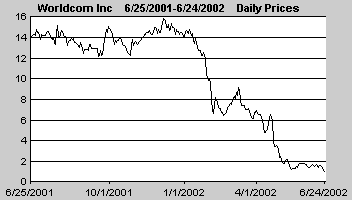WorldCom discovers massive apparent fraud
CFO fired over accounting scandal; SEC notified
June 25, 2002
June 25 — WorldCom has uncovered what people close to the company describe as a massive fraud, inflating a common measure of its earnings by more than $3.8 billion over the last five quarters. The company late Tuesday confirmed its intention to restate its earnings and said it had notified the Securities and Exchange Commission.
“OUR SENIOR MANAGEMENT TEAM is shocked by these discoveries,” said recently-appointed WorldCom CEO John Sidgmore in a statement. “We are committed to operating WorldCom in accordance with the highest ethical standards.”
WorldCom said its chief financial officer, Scott Sullivan, was dismissed by the board of directors. The company also accepted the resignation of David Myers as senior vice president and controller.
WorldCom also said it would cut 17,000 jobs, or more than 20 percent of its work force, starting on Friday, a cost-cutting move expected to save $900 million on an annual basis. The company said the layoffs would be primarily composed of discontinued operations, attrition and contractor terminations.
As first reported by CNBC’s David Faber, the broad outline of the fraud, as described by people familiar with it, transpired like this: Each quarter in 2001 and during the first quarter of 2002, Sullivan would allegedly transfer a similar amount of WorldCom’s ordinary costs and treat them as capital expenditure. The costs are believed to have been related to WorldCom’s network, but should not have been treated as capital expenditure.
When spending is listed as a capital expense, a company can delay applying it against earnings and spread its effect over many years, thus keeping its profits on paper higher. Standard accounting rules are relatively clear about what kind of purchases, for instance office equipment, can be listed as capital expenses and which must be listed as operating expenses and deducted immediately from profits.
In its statement, WorldCom said that “as a result of an internal audit of the company’s capital expenditure accounting, it was determined that certain transfers from line cost expenses to capital accounts during this period were not made in accordance with generally accepted accounting principles.” WorldCom said the “amount of these transfers was $3.055 billion for 2001 and $797 million for first quarter 2002. Without these transfers, the company’s reported EBITDA (earnings before interest, taxes, depreciation and amortization) would be reduced to $6.339 billion for 2001 and $1.368 billion for first quarter 2002, and the company would have reported a net loss for 2001 and for the first quarter of 2002.”
In a story posted on its Web site late Tuesday night, The Washington Post, citing unnamed sources, said the Justice Department had begun a criminal investigation.
|
|
||||||||||||||||||||||||||
|
WorldCom, the No. 2 U.S. long distance carrier, announced
Tuesday it had uncovered massive accounting irregularities
totaling billions of dollars.
Click on the topics above to find out more.
Here are the highlights of the accounting problems:
|
||||||||||||||||||||||||||
Source: Reuters |
||||||||||||||||||||||||||
| Printable version |
Andersen said Tuesday that its work for WorldCom complied with
professional and SEC standards.
“The WorldCom CFO did not tell
Andersen about the line cost transfers nor did he consult with Andersen
about the accounting treatment,” Andersen said in a statement. The
auditing firm said that WorldCom’s financial statements for 2001 should
not be relied upon.
WorldCom said it will issue unaudited
financial statements for 2001 and for the first quarter of 2002 as soon as
practicable.
It is unknown whether former CEO
Bernie Ebbers, who resigned from the company at the end of April, was
aware of the fraud, CNBC reported, quoting sources.
The news could be a body blow to
WorldCom, which is reeling from a low stock price, a crumbling telecoms
market and an ongoing SEC investigation.
SHARES IN FREEFALL
Shares of Clinton-based WorldCom dropped sharply in after hours trading, falling 57 cents to 26 cents a share, down 68 percent from its closing price of 83 cents. Shares of WorldCom this year traded as high as $15 in January but have free fallen since over concerns about the company’s $32 billion in debt, slowing revenues and the SEC investigation.

In March, the SEC requested documents detailing pretax charges
associated with domestic and international wholesale accounts that were no
longer deemed collectible.
The SEC investigation also focused on
disputed customer bills and sales commissions, loans by WorldCom to
officers and directors, customer service contracts and organizational
charts and personnel records for former employees.
Drawing scrutiny and investor
displeasure were the $408 million in loans WorldCom gave to former chief
executive Bernie Ebbers, who resigned in April.
Bond ratings agencies Moody’s
Investors Service, Standard & Poor’s and Fitch all cut their
long-term credit ratings on WorldCom’s debt several times this year.
Shares of WorldCom on Monday closed
down 25 percent after Salomon Smith Barney analyst Jack Grubman, long seen
as a WorldCom supporter, downgraded his outlook on the company.